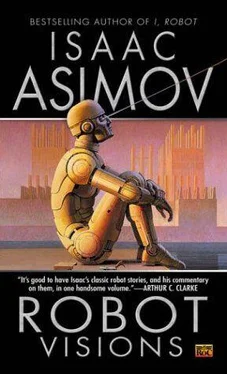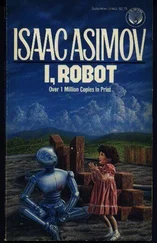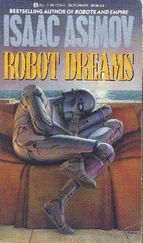Isaac Asimov - Robot Visions
Здесь есть возможность читать онлайн «Isaac Asimov - Robot Visions» весь текст электронной книги совершенно бесплатно (целиком полную версию без сокращений). В некоторых случаях можно слушать аудио, скачать через торрент в формате fb2 и присутствует краткое содержание. Жанр: Фантастика и фэнтези, на английском языке. Описание произведения, (предисловие) а так же отзывы посетителей доступны на портале библиотеки ЛибКат.
- Название:Robot Visions
- Автор:
- Жанр:
- Год:неизвестен
- ISBN:нет данных
- Рейтинг книги:5 / 5. Голосов: 1
-
Избранное:Добавить в избранное
- Отзывы:
-
Ваша оценка:
- 100
- 1
- 2
- 3
- 4
- 5
Robot Visions: краткое содержание, описание и аннотация
Предлагаем к чтению аннотацию, описание, краткое содержание или предисловие (зависит от того, что написал сам автор книги «Robot Visions»). Если вы не нашли необходимую информацию о книге — напишите в комментариях, мы постараемся отыскать её.
Robot Visions — читать онлайн бесплатно полную книгу (весь текст) целиком
Ниже представлен текст книги, разбитый по страницам. Система сохранения места последней прочитанной страницы, позволяет с удобством читать онлайн бесплатно книгу «Robot Visions», без необходимости каждый раз заново искать на чём Вы остановились. Поставьте закладку, и сможете в любой момент перейти на страницу, на которой закончили чтение.
Интервал:
Закладка:
Thus, when we say “cyborg” we are very likely to think, just about exclusively, of a human brain in a robotic body-and we are going to think of that as a robot.
We might argue that a human mind is a human mind, and that it is the mind that counts and not the surrounding support mechanism, and we would be right. I’m sure that any rational court would decide that a human-brain cyborg would have all the legal rights of a man. He could vote, he must not be enslaved, and so on.
And yet suppose a cyborg were challenged: “Prove that you have a human brain and not a robotic brain, before I let you have human rights.”
The easiest way for a cyborg to offer the proof is for him to demonstrate that he is not bound by the Three Laws of Robotics. Since the Three Laws enforce socially acceptable behavior, this means he must demonstrate that he is capable of human (i.e. nasty) behavior. The simplest and most unanswerable argument is simply to knock the challenger down, breaking his jaw in the process, since no robot could do that. (In fact, in my story “Evidence,” which appeared in 1947, I use this as a way of proving someone is not a robot-but in that case there was a catch.)
But if a cyborg must continually offer violence in order to prove he has a human brain, that will not necessarily win him friends.
For that matter, even if he is accepted as human and allowed to vote and to rent hotel rooms and do all the other things human beings can do, there must nevertheless be some regulations that distinguish between him and complete human beings. The cyborg would be stronger than a man, and his metallic fists could be viewed as lethal weapons. He might still be forbidden to strike a human being, even in self-defense. He couldn’t engage in various sports on an equal basis with human beings, and so on.
Ah, but need a human brain be housed in a metallic robotic body? What about housing it in a body made of ceramic and plastic and fiber so that it looks and feels like a human body-and has a human brain besides?
But you know, I suspect that the cyborg will still have his troubles. He’ll be different. No matter how small the difference is, people will seize upon it.
We know that people who have human brains and full human bodies sometimes hate each other because of a slight difference in skin pigmentation, or a slight variation in the shape of the nose, eyes, lips, or hair.
We know that people who show no difference in any of the physical characteristics that have come to represent a cause for hatred, may yet be at daggers-drawn over matters that are not physical at all, but cultural-differences in religion, or in political outlook, or in place of birth, or in language, or in just the accent of a language.
Let’s face it. Cyborgs will have their difficulties, no matter what.
The Sense Of Humor
Would a robot feel a yearning to be human?
You might answer that question with a counter-question. Does a Chevrolet feel a yearning to be a Cadillac?
The counter-question makes the unstated comment that a machine has no yearnings.
But the very point is that a robot is not quite a machine, at least in potentiality. A robot is a machine that is made as much like a human being as it is possible to make it, and somewhere there may be a boundary line that may be crossed.
We can apply this to life. An earthworm doesn’t yearn to be a snake; a hippopotamus doesn’t yearn to be an elephant. We have no reason to think such creatures are self-conscious and dream of something more than they are. Chimpanzees and gorillas seem to be self-aware, but we have no reason to think that they yearn to be human.
A human being, however, dreams of an afterlife and yearns to become one of the angels. Somewhere, life crossed a boundary line. At some point a species arose that was not only aware of itself but had the capacity to be dissatisfied with itself.
Perhaps a similar boundary line will someday be crossed in the construction of robots.
But if we grant that a robot might someday aspire to humanity, in what way would he so aspire? He might aspire to the possession of the legal and social status that human beings are born to. That was the theme of my story “The Bicentennial Man,” and in his pursuit of such status, my robot-hero was willing to give up all his robotic qualities, one by one, right down to his immortality.
That story, however, was more philosophical than realistic. What is there about a human being that a robot might properly envy-what human physical or mental characteristic? No sensible robot would envy human fragility, or human incapacity to withstand mild changes in the environment, or human need for sleep, or aptitude for the trivial mistake, or tendency to infectious and degenerative disease, or incapacitation through illogical storms of emotion.
He might, more properly, envy the human capacity for friendship and love, his wide-ranging curiosity, his eagerness for experience. I would like to suggest, though, that a robot who yearned for humanity might well find that what he would most want to understand, and most frustratingly fail to understand, would be the human sense of humor.
The sense of humor is by no means universal among human beings, though it does cut across all cultures. I have known many people who didn’t laugh, but who looked at you in puzzlement or perhaps disdain if you tried to be funny. I need go no further than my father, who routinely shrugged off my cleverest sallies as unworthy of the attention of a serious man. (Fortunately, my mother laughed at all my jokes, and most uninhibitedly, or I might have grown up emotionally stunted.)
The curious thing about the sense of humor, however, is that, as far as I have observed, no human being will admit to its lack. People might admit they hate dogs and dislike children, they might cheerfully own up to cheating on their income tax or on their marital partner as a matter of right, and might not object to being considered inhumane or dishonest, through the simple expediency of switching adjectives and calling themselves realistic or businesslike.
However, accuse them of lacking a sense of humor and they will deny it hotly every time, no matter how openly and how often they display such a lack. My father, for instance, always maintained that he had a keen sense of humor and would prove it as soon as he heard a joke worth laughing at (though he never did, in my experience).
Why, then, do people object to being accused of humorlessness? My theory is that people recognize (subliminally, if not openly) that a sense of humor is typically human, more so than any other characteristic, and refuse demotion to subhumanity.
Only once did I take up the matter of a sense of humor in a science-fiction story, and that was in my story “Jokester,” which first appeared in the December, 1956 issue of Infinity Science Fiction and which was most recently reprinted in my collection The Best Science Fiction of Isaac Asimov (Doubleday, 1986).
The protagonist of the story spent his time telling jokes to a computer (I quoted six of them in the course of the story). A computer, of course, is an immobile robot; or, which is the same thing, a robot is a mobile computer; so the story deals with robots and jokes. Unfortunately, the problem in the story for which a solution was sought was not the nature of humor, but the source of all the jokes one hears. And there is an answer, too, but you’ll have to read the story for that.
However, I don’t just write science fiction. I write whatever it falls into my busy little head to write, and (by some undeserved stroke of good fortune) my various publishers are under the weird impression that it is illegal not to publish any manuscript I hand them. (You can be sure that I never disabuse them of this ridiculous notion.)
Читать дальшеИнтервал:
Закладка:
Похожие книги на «Robot Visions»
Представляем Вашему вниманию похожие книги на «Robot Visions» списком для выбора. Мы отобрали схожую по названию и смыслу литературу в надежде предоставить читателям больше вариантов отыскать новые, интересные, ещё непрочитанные произведения.
Обсуждение, отзывы о книге «Robot Visions» и просто собственные мнения читателей. Оставьте ваши комментарии, напишите, что Вы думаете о произведении, его смысле или главных героях. Укажите что конкретно понравилось, а что нет, и почему Вы так считаете.








